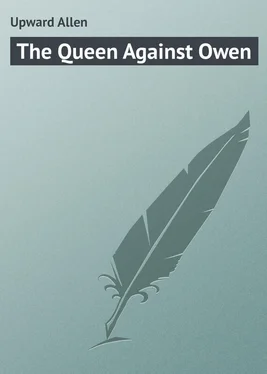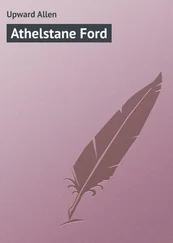Allen Upward - The Queen Against Owen
Здесь есть возможность читать онлайн «Allen Upward - The Queen Against Owen» — ознакомительный отрывок электронной книги совершенно бесплатно, а после прочтения отрывка купить полную версию. В некоторых случаях можно слушать аудио, скачать через торрент в формате fb2 и присутствует краткое содержание. Жанр: foreign_prose, на английском языке. Описание произведения, (предисловие) а так же отзывы посетителей доступны на портале библиотеки ЛибКат.
- Название:The Queen Against Owen
- Автор:
- Жанр:
- Год:неизвестен
- ISBN:нет данных
- Рейтинг книги:5 / 5. Голосов: 1
-
Избранное:Добавить в избранное
- Отзывы:
-
Ваша оценка:
- 100
- 1
- 2
- 3
- 4
- 5
The Queen Against Owen: краткое содержание, описание и аннотация
Предлагаем к чтению аннотацию, описание, краткое содержание или предисловие (зависит от того, что написал сам автор книги «The Queen Against Owen»). Если вы не нашли необходимую информацию о книге — напишите в комментариях, мы постараемся отыскать её.
The Queen Against Owen — читать онлайн ознакомительный отрывок
Ниже представлен текст книги, разбитый по страницам. Система сохранения места последней прочитанной страницы, позволяет с удобством читать онлайн бесплатно книгу «The Queen Against Owen», без необходимости каждый раз заново искать на чём Вы остановились. Поставьте закладку, и сможете в любой момент перейти на страницу, на которой закончили чтение.
Интервал:
Закладка:
To this task he now devoted himself. He assumed the part of a detective rather than a barrister. In the case of an ordinary client conduct such as this would not have been tolerated for a moment by the rigid etiquette of the Bar; but where a case is of such a nature that the barrister is personally concerned, and where he acts as a private individual pursuing his own interests, etiquette has nothing to say. In joining the Bar a man does not cease to be a citizen and to enjoy the rights and privileges of ordinary mortals. It is only in his professional character that his acts come under that rigid supervision which is at once the dread and envy of inferior professions.
But, in any event, George Tressamer’s present mood would not have let him give much weight to considerations of such a character. Too much was at stake. He had to keep in constant communication with Eleanor, to encourage her in face of the ordeals of the coroner and the magistrates, and to protect her from the zeal of the various graduates of the Incorporated Law Society who were thirsting to win glory in her defence.
As a blind to the public, he caused the rumour to be spread that she was without professional advice. This idea was confirmed when it got to be known that she had refused the services of Messrs. Pollard and other gentlemen of the neighbourhood.
Meanwhile Tressamer was enabled to go about with less publicity and to pursue his inquiries. Eleanor was disposed to wonder at him for not employing a detective. But he soon explained that.
‘I know detectives,’ he said to her. ‘I have seen them in the witness-box and out of it. They are admirable men in their own groove. Give them an ordinary crime – a robbery or a forgery – and they can grapple with it. They will track the defaulting cashier to America for you, or run down the absconding broker in the depths of the Australian Bush. But there their usefulness ends. They are no good in the face of a real mystery like this. This is not a question of clever detection; it is a case of reading the human heart and penetrating its motives. A genius could help us, but I know of no genius in Scotland Yard. No, I will do what I can; and if I come to anything in the way of ordinary detective work I will send for Sergeant Wright.’
So he continued to work alone. He had by this time seen and talked with every witness whose name appeared in the brief for the Crown. He had been present, with the air of a casual spectator, at the inquest, and afterwards at the inquiry before the magistrates, which ended in the committal of Eleanor to the assizes to take her trial for wilful murder.
He did not tell Eleanor much as to the results of his inquiries. He would simply mention that he had been talking to Simons, or that he had had a game of billiards with John Lewis, and she had to form her own idea of what had passed between them.
Finally, he went up to London and plunged into that minute study of Hale and Hawkins which had awakened the surprise of his friend Prescott. He was thus kept occupied till both he and his friend were summoned down from town by the approach of the assizes.
CHAPTER IV.
THE ASSIZES
On a certain day in the month of July our lady the Queen, probably clad in ermine, and wearing on her head that gorgeous specimen of the jeweller’s art which, when not in use, may be viewed at the Tower of London for the absurdly moderate sum of sixpence – our lady the Queen, I say, was reminded by her faithful Chancellor that various prisoners were awaiting trial in different parts of England and Wales, and among other places in Mynyddshire.
Whereupon her Majesty, with that constant attention to the welfare of her people which befits a sovereign, at once sat down and wrote, or possibly only signed, a stately document requiring and empowering Sir Daniel Buller, Knight, one of the judges of her High Court; Sir John Wiseman, Knight, another of the aforesaid judges; Walter Reynold Davies, Esquire, one of her counsel learned in the law; Joseph Robert Pollington, Esquire, another of her counsel learned in the law; and Henry Jones, Esquire, yet a further specimen of her counsel learned in the law, to proceed to Mynyddshire, and there and then open the gaols and try such prisoners as were inside them.
In a similar and not less elaborate document she thoughtfully went on to provide for their hearing and deciding, at the same time, any disputes over civil matters which might possibly have arisen among the population of that remote locality since it was last honoured by the presence of such bright visitants. This considerate act on her Majesty’s part was, of course, intended to save her emissaries a second journey. Even a monarch, in the administration of justice, need not be above killing two birds with one stone.
In proceeding to Mynyddshire, however, a very invidious distinction was drawn between the gentlemen named in the Royal Commission. The two first named, simply because they were knights and judges, went down in state, were met at the station by the high-sheriff of the county, and escorted by twenty javelin-men in gay attire to the comfortable lodgings prepared for them. The other three, for no other earthly reason than because their position was less exalted, had to get down as best they might, scramble into cabs with their portmanteaus, and put up at a common hotel. How true is the venerable saying, ‘To him that hath shall be given, and from him that hath not shall be taken away even that which he hath’!
Having thus got an unfair start, the two judges preserved it to the end. They tried all the cases themselves, and their unfortunate colleagues had to be content with what crumbs they could pick up by appearing in court as common advocates.
The Southern Circuit has long been popular with judges. There is a great difference in circuits. The two northern ones, with their vast populations and immense amount of work, are the bugbear of the puisne judge. The scenery of some of the other circuits is flat, and there is not much amusement going on in the assize towns. But the Southern combines several advantages. It is far from heavy as regards work, the country in many parts is beautiful, and the train-service between the county towns is fairly good.
For these reasons the old stagers on the Bench are in the habit of trying to get the Southern Circuit. On the present occasion they had been successful. Sir Daniel Buller and Sir John Wiseman may not have been extremely popular with the Bar, but they were very popular with each other. They came down to Abertaff feeling in good form, Sir John to preside over the civil court, and Sir Daniel to mete out justice to the inmates of the county gaol.
Not for many years had there been such excitement at assize time in the city. This excitement was due to two causes – the javelin-men and the society murder.
Javelin-men are dying out. In former times, when the office of sheriff was a mark of high social dignity, and before the new-fangled post of lord-lieutenant had usurped so much of its splendour, the shrievalty was an epoch in a county gentleman’s career. It was considered almost worth being ruined for. A heavy mortgage was not grudged as a consequence of the lavish splendour with which the office was surrounded. In those days javelin-men were a reality. Clad in semi-military uniforms modelled on the master’s family livery, and armed with weapons of an extinct fashion, they simulated the state of vice-royalty. Many a German princelet has enjoyed a less imposing body-guard than an English sheriff of the olden time.
But the railways have killed all that. Everyone now seeks distinction in the Metropolis. County society has become a byword for the old-fashioned and the humdrum, for bad living, bad manners, and bad taste. No one would now dream of embarrassing his estate to secure a merely local renown. Hence the decay of the shrievalty. The modern high-sheriff looks upon his obligatory office as a duty rather than an honour. He contents himself with the cheap services of the county police force for his retinue, and foregoes the expensive luxury of the javelin-men.
Читать дальшеИнтервал:
Закладка:
Похожие книги на «The Queen Against Owen»
Представляем Вашему вниманию похожие книги на «The Queen Against Owen» списком для выбора. Мы отобрали схожую по названию и смыслу литературу в надежде предоставить читателям больше вариантов отыскать новые, интересные, ещё непрочитанные произведения.
Обсуждение, отзывы о книге «The Queen Against Owen» и просто собственные мнения читателей. Оставьте ваши комментарии, напишите, что Вы думаете о произведении, его смысле или главных героях. Укажите что конкретно понравилось, а что нет, и почему Вы так считаете.












